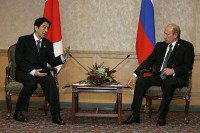Russian Federation and Japan to Further Economic Cooperation: Territorial Dispute Secondary to Trust
Galina Zobova, Noriko Watanabe, and Lee Jay Walker
Modern Tokyo Times
The Russian Federation and Japan are in discussion about further boosting economic cooperation and focusing on geopolitical realities. This proposed approach based on a powerful eight-point plan is in the interest of both nations. Therefore, President Vladimir Putin of the Russian Federation and Prime Minister Shinzo Abe of Japan appear to be set on developing relations to a much higher degree.
It is known that Abe and Putin have a mutual respect towards each other based on past meetings that laid firm foundations. Of course, issues like the Ukraine remain problematic based on pressure from America being ushered on Japan. Yet despite this, and the perennial territorial dispute between both nations, it is abundantly clear that Japan and the Russian Federation seek to break free from past shackles.
Special attention is being put on the energy sector based on Japan being over-reliant on the Middle East, developing high technology, and the medicine sector. Indeed, for the Russian Federation, the development of powerful sectors is in the interest of both nations. This is based on natural geopolitics and complimentary factors involving both nations.
In a past article, Modern Tokyo Times stated, “The government of Japan under Prime Minister Abe needs to take a bold and urgent step towards focusing strongly on the Russian Federation. Of course, America will remain to be a powerful pivot for the foreseeable future. However, if political elites in Tokyo are wise then the other powerful pivot could become the Russian Federation. After all, the military rise of China is gathering pace, tensions are increasing in the South China Sea between various nations based on China’s increasing assertiveness, the Korean Peninsula remains volatile, China and Taiwan issues remain, energy issues are problematic for Japan – and the Malacca Straits and the South China Sea could hinder energy supply routes based on various tensions – and other important factors remain. Therefore, it is essential for Japan to diversify its energy, to focus on new markets, to increase geopolitical safeguards and to have a solid relationship with a major regional and international power. This reality points to Japan forging powerful relations with the Russian Federation irrespective of constraints put on Tokyo by political elites in Washington.”
It is incumbent on Japan to move forward in the economic, political, and military realm, with the Russian Federation before expecting any real breakthrough on the territorial issue. Similarly, Japan must not expect the outcome to be one hundred percent in either direction because the Russian Federation is equally adamant about its claim. Instead, Japan must acknowledge that unlike disputes with China and South Korea, that the Russian Federation is open to genuine investments and political commitments that suit both nations.
Abe said earlier this year “The Northern Territories (Kurile) issue can’t be resolved without direct talks between leaders… We have had more than 70 years of the post-war era and still a peace treaty has not been concluded. This is anomalous.”
However, Abe should go further by acknowledging the geopolitical concerns of the Russian Federation in relation to America’s containment policy. In other words, the Russian Federation desires Japan to become a more honest broker between the spheres of Moscow and Washington respectively. Therefore, issues like the Ukraine, an issue of no major significance to the geopolitics of Japan, should not become an American rubber stamp.
Modern Tokyo Times said, “The crisis in Crimea (Russian Federation) and southeastern Ukraine isn’t of any major geopolitical significance to Japan. Other nations like America, France, Germany and the United Kingdom may think otherwise. This is based on their collective containment policies vis-à-vis NATO and the European Union expansion that appear to be aimed at the Russian Federation. However, for Japan to agree with G-7 nations is shortsighted, even if Tokyo is more muted on the subject of the Ukraine crisis.”
Putin recently said, “We don’t trade territories” with regards to the Kuril Islands and equally made it clear that past territorial issues with China were based on completely different factors – for example, mutual trust. However, interestingly, Putin said, “If we reach the same level of trust with Japan, we might be able to reach certain compromises.”
In other words, it is essential for Japan to focus on sincere policies towards the Russian Federation in various important realms. Likewise, political elites in Tokyo must not be overly quick to take the side of Washington against Moscow. Instead, a new approach is needed whereby Japan recognizes the importance and influence of the Russian Federation – and acknowledges the geopolitical reality of Japan in relation to this near neighbor. It this happens then “certain compromises” may be possible once a genuine level of trust is garnered by political elites in the Russian Federation.
https://www.rt.com/news/357970-putin-japan-bloomberg-interview/

Modern Tokyo News is part of the Modern Tokyo Times group
DONATIONS to SUPPORT MODERN TOKYO TIMES – please pay PayPal and DONATE to sawakoart@gmail.com
http://moderntokyotimes.com Modern Tokyo Times – International News and Japan News
http://sawandjay.com Modern Tokyo Times – Fashion
https://moderntokyonews.com Modern Tokyo News – Tokyo News and International News
http://global-security-news.com Global Security News – Geopolitics and Terrorism
PLEASE JOIN ON TWITTER
https://twitter.com/MTT_News Modern Tokyo Times
PLEASE JOIN ON FACEBOOK
